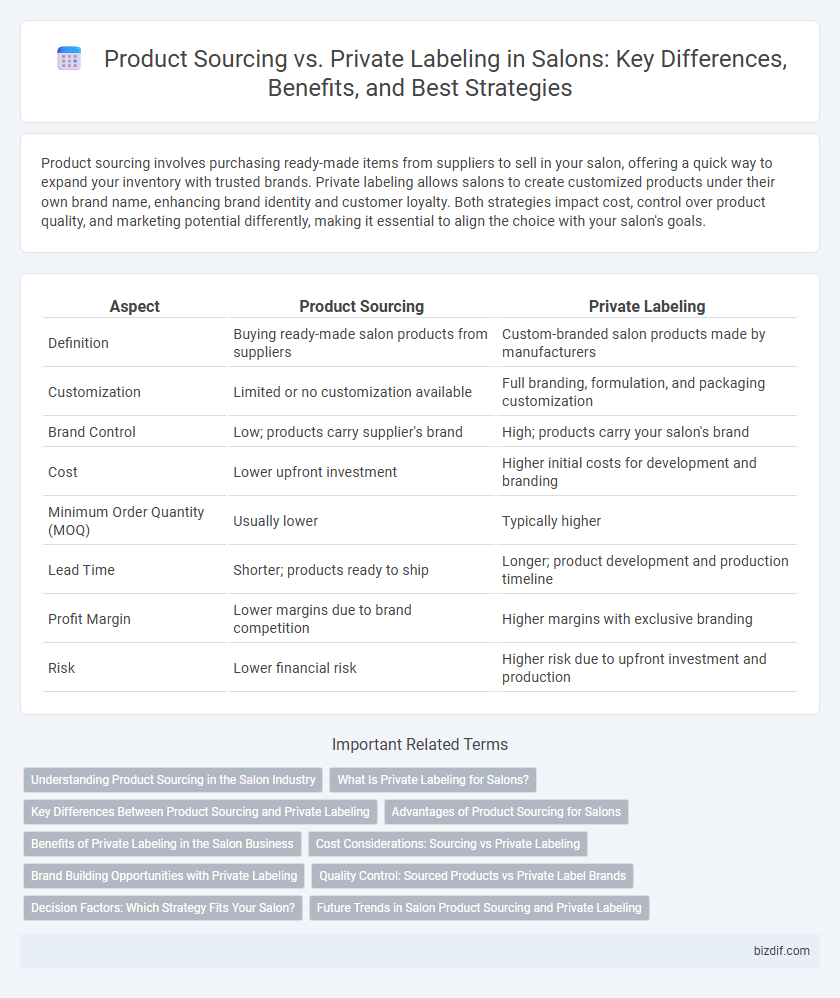Product sourcing involves purchasing ready-made items from suppliers to sell in your salon, offering a quick way to expand your inventory with trusted brands. Private labeling allows salons to create customized products under their own brand name, enhancing brand identity and customer loyalty. Both strategies impact cost, control over product quality, and marketing potential differently, making it essential to align the choice with your salon's goals.
Table of Comparison
| Aspect | Product Sourcing | Private Labeling |
|---|---|---|
| Definition | Buying ready-made salon products from suppliers | Custom-branded salon products made by manufacturers |
| Customization | Limited or no customization available | Full branding, formulation, and packaging customization |
| Brand Control | Low; products carry supplier's brand | High; products carry your salon's brand |
| Cost | Lower upfront investment | Higher initial costs for development and branding |
| Minimum Order Quantity (MOQ) | Usually lower | Typically higher |
| Lead Time | Shorter; products ready to ship | Longer; product development and production timeline |
| Profit Margin | Lower margins due to brand competition | Higher margins with exclusive branding |
| Risk | Lower financial risk | Higher risk due to upfront investment and production |
Understanding Product Sourcing in the Salon Industry
Product sourcing in the salon industry involves selecting and purchasing beauty products from various manufacturers or suppliers to meet client needs and ensure service quality. Effective sourcing requires evaluating product ingredients, supplier reliability, and market trends to offer high-demand items like shampoos, conditioners, and styling tools. Establishing strong supplier relationships and staying updated on innovative salon products enhances customer satisfaction and operational efficiency.
What Is Private Labeling for Salons?
Private labeling for salons involves creating customized beauty products branded specifically for the salon, allowing exclusive offerings that reflect the salon's identity. This strategy enables salons to control product formulations, packaging, and marketing, differentiating their services and increasing customer loyalty. Unlike standard product sourcing, private labeling builds brand equity and often yields higher profit margins through unique, salon-exclusive lines.
Key Differences Between Product Sourcing and Private Labeling
Product sourcing involves purchasing ready-made products from suppliers to sell under the salon's existing brand, which requires lower upfront investment and faster market entry. Private labeling allows salons to customize products with their own branding and formulations, providing greater control over product quality and brand identity. Key differences include control over product design, investment scale, and potential for differentiation in the competitive salon market.
Advantages of Product Sourcing for Salons
Product sourcing offers salons access to a diverse range of high-quality beauty products without the risks of inventory investment or manufacturing complexities. Salons can quickly adapt to market trends by selecting from established brands, ensuring client satisfaction with trusted and tested products. This approach enhances operational flexibility and reduces upfront costs compared to private labeling, allowing salon owners to focus on service excellence and customer experience.
Benefits of Private Labeling in the Salon Business
Private labeling in the salon business offers enhanced brand identity by allowing salons to customize and control product formulations tailored to their clients' specific needs, leading to increased customer loyalty. It improves profit margins through direct product sourcing and eliminates reliance on third-party brands, ensuring consistent quality and supply. Private labeling also enables salons to differentiate their services in a competitive market, building a unique brand presence that drives repeat business and brand recognition.
Cost Considerations: Sourcing vs Private Labeling
Cost considerations in product sourcing typically involve lower upfront expenses due to purchasing pre-made items in bulk from established suppliers, which reduces manufacturing risks and inventory costs. In contrast, private labeling demands higher initial investment for product development, packaging design, and quality assurance but offers greater control over branding and potential for higher profit margins. Salons must weigh the balance between immediate cost savings and long-term brand value when deciding between sourcing and private labeling products.
Brand Building Opportunities with Private Labeling
Private labeling in salons enables enhanced brand building by offering exclusive products that reflect the salon's identity and quality standards. This strategy fosters customer loyalty through unique formulations and packaging that differentiate from generic product sourcing options. Leveraging private labeling amplifies brand recognition and increases profit margins by controlling product development and marketing.
Quality Control: Sourced Products vs Private Label Brands
Quality control in product sourcing often depends on the supplier's standards and consistency, which can vary widely across different manufacturers. Private labeling offers salons greater control over product formulations, packaging, and quality assurance processes, ensuring alignment with brand identity and customer expectations. This direct oversight reduces the risk of substandard products and enhances overall client satisfaction and brand loyalty.
Decision Factors: Which Strategy Fits Your Salon?
Product sourcing offers salons access to a wide range of established brands with proven customer appeal, enabling quick inventory turnover and minimal upfront investment. Private labeling allows salons to create customized, exclusive products that enhance brand identity and foster customer loyalty, though it requires higher initial costs and longer development timelines. Choosing between product sourcing and private labeling depends on factors like budget, brand vision, and desired control over product formulation and marketing.
Future Trends in Salon Product Sourcing and Private Labeling
Future trends in salon product sourcing emphasize sustainable and ethically sourced ingredients, driven by increasing consumer demand for eco-conscious beauty solutions. Private labeling will increasingly leverage advanced customization technologies, enabling salons to offer unique, brand-exclusive formulations that enhance customer loyalty. Integration of AI and data analytics is expected to optimize inventory management and predict emerging beauty trends, streamlining the supply chain from sourcing to retail.
Product Sourcing vs Private Labeling Infographic

 bizdif.com
bizdif.com